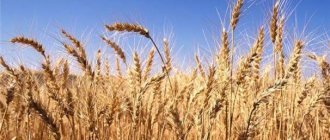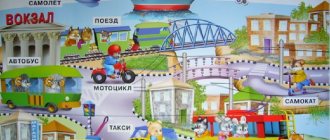Lexico-grammatical lesson in a speech therapy group preparatory to school on the topic “Vegetables”. The material selected for the lesson is appropriate for the age of the children, is easy to understand, full of play and clarity, and involves the active activity of the children. Presentation, artistic expression, and speech exercises were used, which contributed to the accumulation and refinement of children’s vocabulary. Attention was paid to the development of learning skills in children: the ability to listen and hear the instructions of the teacher, to work at a certain pace.
Lexical topic “Vegetables. Garden"
We enrich and activate our vocabulary. We consolidate knowledge of nouns : salad, soup, juice, cucumber, tomato (tomato), potatoes, beets, carrots, onions, turnips, cabbage, radishes, peppers, garlic, eggplant, zucchini, squash, greens, parsley, dill, radish, pumpkin , beans, beans, peas, pods, tops, roots, fruits, seeds, tubers, leaves, head of cabbage, salad, beetroot, vinaigrette, juice, bag, box, path, harvest, vegetable garden, bed, soil, planting, watering; adjectives: colorful, large, long, short, triangular, oval, ripe, unripe, ripe unripe, raw, boiled, hard, soft, bitter, sweet, sour, salty, juicy, healthy, light, heavy, fresh, large, small , red, green, yellow, ripe, unripe, tasty, tasteless, sweet, sour, bitter, salty, pickled, canned, raw, boiled, healthy, large, small, round, oval, elongated, oblong, smooth, ripe, fragrant , aromatic, juicy, vegetable; verbs: plant, care, grow, sow, loosen, ripen, water, ripen, collect, sprinkle, pull out, dig, cut, wash, rub, cook, stew, fry, eat, crunch, prepare, salt, ferment, preserve, pickle, grow, grow, ripen, water, weed, clean, dig, pick, pull out, collect, dry, squeeze, rub, treat, clean, share; adverbs: high, low, tasty, tasteless, healthy, harmful.
Lexical and grammar lesson on the topic: “Vegetables”
Integration of educational areas:
- "Cognitive Development"
- “Socio-communicative development”,
- "Physical development"
Software tasks:
Speech development:
1. Consolidate and activate the vocabulary on the lexical topic “Vegetables”.
2. Exercise in the formation and use in speech of nouns with diminutive and augmentative meanings
3. Continue to teach how to answer the questions posed.
Cognitive development:
1. Develop observation, attention, thinking, coherent speech.
Social and communicative development:
1. Continue working to foster friendly relationships between children.
Physical development:
1. Develop fine motor skills of the fingers.
2. Develop the ability to coordinate speech with movements.
Equipment: subject pictures depicting vegetables, plot picture “Vegetable Garden”, vegetables (tomato, cucumber, cabbage, carrots, potatoes, onions, garlic, zucchini, eggplant, peppers, radishes, turnips, radishes, pumpkin).
Games and exercises
Game “Greedy” (children 4-8 years old) Add the word “my”, “mine”, “mine” to the name of each vegetable (my carrots, my cucumber)
Game “One - Many” (children 4-8 years old) . Up to 5 years, the version of the game is shortened (without a lot of words). Tomato - tomatoes - a lot of tomatoes potatoes - potatoes - a lot of potatoes (potatoes) eggplant - eggplants - a lot of eggplants pepper - peppers - a lot of peppers zucchini - zucchini - a lot of zucchini pumpkin - pumpkins - a lot of pumpkins carrots - carrots - a lot of carrots beets - beets - a lot beets (beets - meaning “many pieces”) onion (bulb) - onion (bulbs) - a lot of onions (bulbs) turnip - turnips - a lot of turnips radish - radishes - a lot of radishes (radish - meaning "many pieces") garlic - garlic - a lot of garlic (many heads of garlic) parsley - parsley - a lot of parsley cucumber - cucumbers - a lot of cucumbers pepper - peppers - a lot of peppers (meaning “many pieces”) head of cabbage - heads of cabbage - many heads of cabbage pea - peas - many peas pod - pods - a lot of pods
Exercise “Name it affectionately” (for children over 4 years old) Cucumber - cucumber - cucumbers tomato - tomato - tomatoes potatoes - potatoes - potatoes eggplant - eggplant - eggplants pepper - pepper - peppers pumpkin - pumpkin (pumpkin) - pumpkins radish - radish - radishes carrots - carrots (carrots) - carrots beets - beets (beets) - beets onions (bulbs) - onions (onions) - turnip bulbs - turnips (turnips) - turnips garlic - garlic - garlic parsley - parsley - parsley dill - dill - dill cabbage - cabbage - cabbage beans - beans - beans
Game “Say the other way around” (children from 5 years old) The zucchini is large, and the cucumber is small, the potatoes are large, and the radishes are . The (small) pepper is empty inside, and the carrots are . (full) the tomato is soft and the cucumber is . (solid)
Game “Say the other way around” (children from 6 years old) A good garden bed - ……. bad bed Old potatoes - ...... new potatoes Heavy bag - ...... light bag Large harvest - ………. small harvest Clean carrot - ……… dirty carrot Ripe tomato - ...... unripe tomato
Exercise “Complete the sentence” (children from 5 years old) The tomato is round, and the carrots. (oblong). The tomato is red and the carrots. The tomato is soft and the carrots... The tomato is sour, and the carrots. A tomato has a seed inside, and a carrot has a seed inside. The tomato grows on the ground, and the carrots. (in the ground).
Game “Names of juices” (children from 5 years old) Cucumber juice - cucumber juice Beet juice - beet juice Onion juice - onion juice Tomato juice - tomato juice Cabbage juice - cabbage juice Pumpkin juice - pumpkin juice Carrot juice - carrot juice
Game “Who can name the most qualities? ” We consolidate the ability to coordinate nouns and adjectives denoting color, shape, size, taste.
Color - red, orange, green. Taste - sour, sweet, bitter. Shape: round, oval, triangular. Surface - smooth, rough, uneven. Tomato (what?) red, round, juicy, sweet, soft. Beets (what kind?) are burgundy, round, juicy, sweet, firm.
Development of auditory attention . Corrected sentences must be spoken in their entirety. Let's make mashed potatoes from carrots. Let's prepare beetroot salad from garlic. Let's make carrot juice from onions. Let's make cabbage pie from zucchini. Let's make cucumber salad from tomatoes. Let's make pea soup from radishes. Let's make pumpkin jam from dill.
Game "Count" (for children over 5 years old) 1 tomato - 2 tomatoes - 5 tomatoes 1 cucumber - 2 cucumbers - 5 cucumbers 1 zucchini - 2 zucchini - 5 zucchini 1 pepper - 2 peppers - 5 peppers 1 beet - 2 beets - 5 beets 1 head of cabbage - 2 heads of cabbage - 5 heads of cabbage 1 head of garlic - 2 heads of garlic - 5 heads of garlic 1 clove of garlic - 2 cloves of garlic - 5 cloves of garlic 1 pea pod - 2 pea pods - 5 pea pods 1 pea - 2 peas - 5 peas
At 6-7 years old, you can complicate this exercise by adding a suitable adjective to the noun. One crispy cucumber, two crispy cucumbers, etc.
“Harvesting” (children over 6 years old) An adult shows pictures of vegetables and asks the child to answer the question: “How is this vegetable harvested?” The child makes sentences - for example: cabbage is cut, etc. Carrots, beets, turnips, radishes - . (pulling) Cucumbers, tomatoes, peas - . (pluck) Cabbage - . (cut) Potatoes - . (dig up)
Classification of concepts “Which words are superfluous and why?” Onions, turnips, plantain, lettuce (plantain is not a vegetable, but a herb); garlic, radishes, beets, currants, zucchini, strawberries, cucumbers, chamomile potatoes, peppers, eggplant, pumpkin
Game “Guess the vegetable by its part” . Head – Tops – Pod – Root – Slice – Stem – Ear – Clove – Tuber – Bunch –
Game “Who can name the most qualities? ” Goal: agreement of nouns and adjectives denoting color, shape, size, taste. Color - red, orange, green. Taste - sour, sweet, bitter. Shape: round, oval, triangular. Surface - smooth, rough, uneven. Tomato (what?) red, round, juicy, sweet, soft. Beets (what kind?) are burgundy, round, juicy, sweet, firm.
“Speech therapy lesson on the lexical topic “Vegetables” with homework”
Summary of a subgroup speech therapy lesson in the senior group on the topic “Vegetables”
Lesson No. 1
Purpose of the lesson:
formation of the lexical and grammatical structure of speech on the lexical topic “Vegetables”.
Tasks:
Correctional and educational:
- Systematize knowledge about vegetables, activate your vocabulary on this topic.
- Learn to form the plural of nouns.
- Learn to form nouns with diminutive suffixes.
- Practice forming relative adjectives and agreeing adjectives with nouns.
- Practice the correct use of the prepositions “on, in.”
Correctional and developmental:
- Develop articulatory motor skills.
- Develop gross and fine motor skills.
- Develop the lexical and grammatical structure of speech.
- Develop memory, attention, thinking.
Correctional and educational:
- Foster independence and the ability to listen to children’s answers.
- Cultivate kindness and a desire to help others.
Equipment:
- magnetic board,
- pictures of vegetables,
- plot picture “Vegetable Garden”,
- ball,
- mirrors
OD move:
1. Organizational moment.
Speech therapist:
Guys, the Gnome came to visit us, and he prepared a lot of interesting games. But first, guess his riddle:
They are different, They ripen in vegetable gardens, They are called in one word, Mom adds them to borscht!
Children:
Vegetables!
Speech therapist: Correct. The topic of today's lesson is vegetables. Listen and guess what vegetable it is.
A girl grew underground, but fresh and round-faced. The dog Artoshka barks loudly: - Woof-woof-woof - hello,...! (potato)
One hundred clothes - All without fasteners. (cabbage)
A beautiful maiden sits in prison, and her braid is on the street. (carrot)
2. Main part.
Speech therapist
: Guys, tell the Gnome what other vegetables do you know?
Children:
cucumber, tomato, zucchini, onion, beets.
( Vegetables are attached to the magnetic board one by one).
Speech therapist:
Do you know that vegetables grow in garden beds (
a picture “Vegetable Garden” is attached to the board).
Some vegetables grow on the ground, these include tomatoes, cucumbers, and cabbage. Some vegetables grow in the ground, these include potatoes and carrots. What other vegetables grow in the ground, name them. When vegetables are ripe, they need to be harvested. Vegetables that grow on the ground are picked and cut. Vegetables that grow in the ground are dug up and pulled out.
1) Finger gymnastics
Guys, we have already said that vegetables grow in the garden in the garden. Let's see how many vegetables grow in our garden.
There are a lot of vegetables in our garden. Let's count them, it will become more fun. (we squeeze and unclench our fingers)
Carrot, onion and cucumber, tomato and pepper. ( we bend our fingers, starting with the thumb
)
Five types of vegetables were named, Five fingers were clenched into a fist. ( we squeeze and unclench our fingers)
2) Massage of biologically active points of the face “Peas”.
There were peas in the store - massage your cheeks in a circular motion.
The pea screamed: “Oh - Oh!”
– massage the ears with movements from top to bottom
Here I am, kids, look, don’t look at the candies –
massage the outer corners of the eyes
Well, buy me quickly –
press on the wings of the nose with your index fingers.
There is no benefit from sweets -
we use our index fingers to massage the corners of our lips
. I need it more than a hundred sweets!
– press your palms to your cheeks.
3) Game “Name it kindly”
Speech therapist:
Our guest lives in a magical land where all objects are small, so they call everything affectionately. Now we will try to affectionately name vegetables:
Children:
cucumber - cucumber, tomato - tomato, cabbage - cabbage, potato - potato, onion - onion.
4) Game “One - Many”
Speech therapist:
Guys, Gnome has prepared the next game for you. Now I will tell you one vegetable, and you will tell me when there are many of them.
Children:
cucumber - cucumbers, onion - onions, zucchini - zucchini, tomato - tomatoes.
5) Physical exercise “Planting a vegetable garden”
Speech therapist:
The gnome loves to eat vegetables all year round, but he just forgot what he needs to do to reap a good harvest. Let's remember together. Watch and repeat after me.
We took the shovels and dug up the beds. They took the rake in hand and leveled the beds. We planted the seeds in rows together, and then watered them with warm water.
6) Didactic game “Harvesting”
Speech therapist:
A good harvest has grown in the garden, let's harvest it. Tell me, which vegetables do I pick, which ones do I pull out, which ones do I cut, and which ones do I dig up?
Picked: ( tomato, cucumber
), Pull out: (
onions, carrots
), Cut:
(zucchini, cabbage
), Dig out: (
potatoes
).
7) Game "Cooking"
Speech therapist:
Guys, tell me what can be cooked from vegetables?
Children:
juice, soup, salad...
Speech therapist:
Think and tell me, carrot juice - what kind of juice?
Children:
Carrot.
Juice: carrots, cucumber, tomato.
Salad: cabbage, cucumber, vegetables. Soup: tomato, potato, vegetables. Speech therapist:
Well done!
 Didactic game "Cook"
Didactic game "Cook"
Speech therapist:
Let's prepare a treat (
soup or salad
).
Choose the right vegetables for the dish, name them and explain how you will prepare this “treat” ( take, wash, peel, cut, cook
).
9) Speech therapist:
Guys, let's remember which vegetables grow underground and which on the ground.
The speech therapist throws a ball to the child and names a vegetable.
Children: Carrots grow underground, etc.
Summary of the lesson.
Repetition and generalization of the material that children learned in class.
Speech therapist:
Children, our guest liked the way you answered his riddles and willingly played. Let's repeat what is shown in the pictures, where vegetables grow, and what can be cooked.
- Well done, guys, the gnome has prepared a surprise for you, he brought you magic leaves, on them you will find different vegetables!
Finger gymnastics
Cabbage We chop and chop cabbage, We salt and salt cabbage, We three and three cabbage, We press and press cabbage. (Imitation of movements.)
Vegetables Little girl Zinochka has Vegetables in a basket: Children make their hands into a “basket”. Here is a pot-bellied zucchini. Bend your fingers, starting with the thumb. She put it on the barrel, Pepper and carrot. She laid it deftly, Tomato and cucumber. Our Zina is great! Show thumbs up.
How many beds are there in the garden? In Fedora's garden there are tomatoes growing in the beds, and in Filat's garden there are a lot of different lettuces. Grandma Fyokla has four beds of beets. Uncle Boris has a lot of radishes. Masha and Antoshka have two rows of potatoes. Alternately bend your fingers for every two lines of text.
“Harvest” Glad, two, three, four, five - Alternately, clap your palms, then your fists. Let’s help you collect the harvest. Repeat the exercise after me. Bend your fingers for each name of the vegetable. In it, the sound T came to the garden bed. Here's a pumpkin, and here's a tomato. Here is cabbage, here is lettuce, caraway seeds, potatoes, artichokes and parsley roots. Everything that we have grown, We alternately clap our palms and then our fists. We will eat until spring.
Logorhythmic exercises (coordination of speech and movement)
Potatoes We dug up potatoes, picked cucumbers from the ridge, pulled out all the carrots, deftly cut the cabbage and brought it to you as a gift in a basket from the ground. (Squats, bends, imitation movements.)
Vegetable Garden Repeat the exercise after me (Step in place.) We came to our garden bed. Here's a pumpkin, and here's a tomato. (Extend your arms to the left, to the right.) Here is cabbage, here is lettuce. (Bend over to your left leg, then to your right.) Cumin, potatoes, artichoke (Straighten up. Hands on your waist, to your shoulders, up.) And parsley root. (Lower your hands.) Everything that we have grown, (Spread your arms to the sides.) We will eat until spring. (Hands down, straighten up.)


